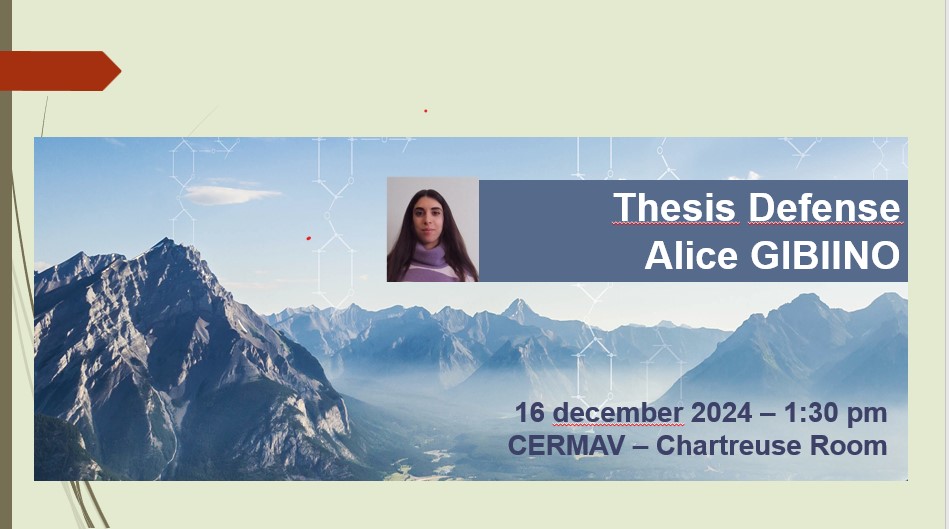- Share
- Share on Facebook
- Share on X
- Share on LinkedIn
Soutenance
On December 16, 2024
Saint-Martin-d'Hères - Domaine universitaire

Alice Gibiino will defend her thesis ""Formation and Mechanical Properties of Biocompatible Self-Healing Hydrogels"" on Monday December 16, 2024, 1:30 pm, CERMAV - Salle Chartreuse, Domaine Universitaire of Grenoble
Hydrogels are promising materials for tissue engineering due to their structural similarity with the extracellular matrix. However, designing hydrogel systems that can replicate a broad range of tissue stiffness (from soft to rigid) while possessing inherent self-repair capabilities, as seen in certain tissues, remains a significant challenge remains a key challenge.
To tackle this challenge, a first biocompatible hydrogels was devised. Based on hyaluronic acid (HA) chains cross-linked with silica nanoparticles (SiNPs) via dynamic covalent bonds in physiological conditions (pH ~7.4). Rheological measurements revealed that the gel stiffness can be increased by adjusting the SiNP concentration, However the gel remains relatively soft (Shear modulus ~1 to 40 Pa). Coarse-grained molecular dynamics simulations provided insights into these experimental observations and guided future experiments by revealing the molecular mechanism of reinforcement and that the key parameters influencing gel stiffness are polymer chain flexibility, the polymer-to-particle size ratio, and nanoparticle concentration. As these parameters are not easily modified experimentally, a second hydrogel system was made in which HA chains can form dynamic covalent bonds not only with the SiNPs but also with other HA chains thereby forming a polymeric network reinforced by SiNPs. By tuning the nanoparticle concentration, the hydrogel reached a higher shear modulus (~1 kPa), exhibited strain-stiffening behavior under large oscillatory deformations —similar to that observed in native biopolymer networks— and displayed self-healing properties.
In conclusion, through a dialogue between simulations and experiments, we developed model composite hydrogel systems that can be formed in physiological conditions (pH ~7.4) and exhibit a tunable mechanical response, capable of mimicking the mechanical properties of some biological tissues
Date
1:30 pm
Localisation
Saint-Martin-d'Hères - Domaine universitaire
CERMAV
Salle Chartreuse
Domaine Universitaire
Grenoble
- Share
- Share on Facebook
- Share on X
- Share on LinkedIn